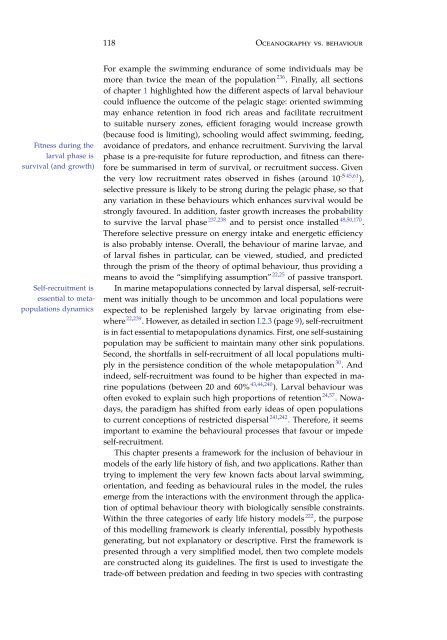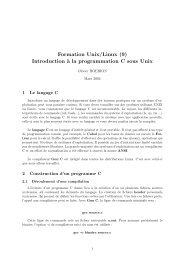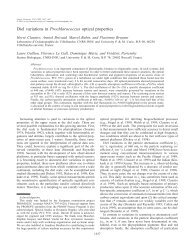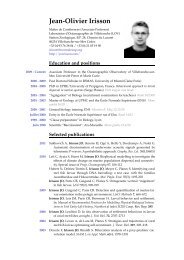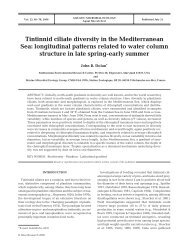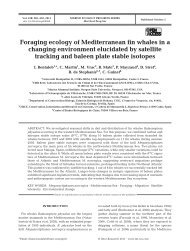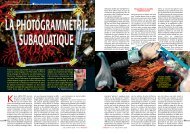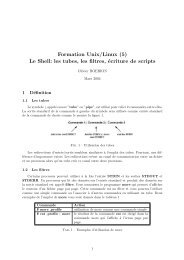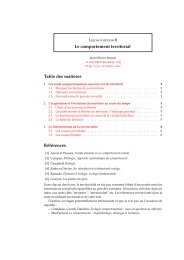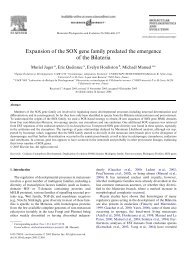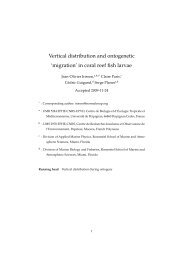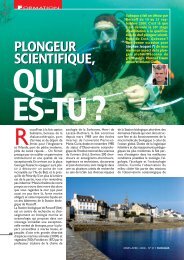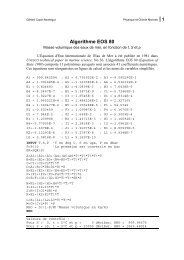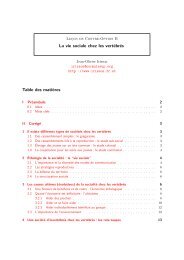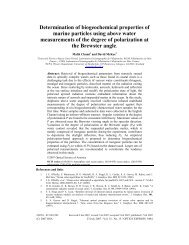Dissertation - HQ
Dissertation - HQ
Dissertation - HQ
Create successful ePaper yourself
Turn your PDF publications into a flip-book with our unique Google optimized e-Paper software.
118 Oceanography vs. behaviour<br />
Fitness during the<br />
larval phase is<br />
survival (and growth)<br />
Self-recruitment is<br />
essential to metapopulations<br />
dynamics<br />
For example the swimming endurance of some individuals may be<br />
more than twice the mean of the population 236 . Finally, all sections<br />
of chapter 1 highlighted how the different aspects of larval behaviour<br />
could influence the outcome of the pelagic stage: oriented swimming<br />
may enhance retention in food rich areas and facilitate recruitment<br />
to suitable nursery zones, efficient foraging would increase growth<br />
(because food is limiting), schooling would affect swimming, feeding,<br />
avoidance of predators, and enhance recruitment. Surviving the larval<br />
phase is a pre-requisite for future reproduction, and fitness can therefore<br />
be summarised in term of survival, or recruitment success. Given<br />
the very low recruitment rates observed in fishes (around 10 -5 45,61 ),<br />
selective pressure is likely to be strong during the pelagic phase, so that<br />
any variation in these behaviours which enhances survival would be<br />
strongly favoured. In addition, faster growth increases the probability<br />
to survive the larval phase 237,238 and to persist once installed 48,50,170 .<br />
Therefore selective pressure on energy intake and energetic efficiency<br />
is also probably intense. Overall, the behaviour of marine larvae, and<br />
of larval fishes in particular, can be viewed, studied, and predicted<br />
through the prism of the theory of optimal behaviour, thus providing a<br />
means to avoid the “simplifying assumption” 22,25 of passive transport.<br />
In marine metapopulations connected by larval dispersal, self-recruitment<br />
was initially though to be uncommon and local populations were<br />
expected to be replenished largely by larvae originating from elsewhere<br />
22,239 . However, as detailed in section I.2.3 (page 9), self-recruitment<br />
is in fact essential to metapopulations dynamics. First, one self-sustaining<br />
population may be sufficient to maintain many other sink populations.<br />
Second, the shortfalls in self-recruitment of all local populations multiply<br />
in the persistence condition of the whole metapopulation 30 . And<br />
indeed, self-recruitment was found to be higher than expected in marine<br />
populations (between 20 and 60% 43,44,240 ). Larval behaviour was<br />
often evoked to explain such high proportions of retention 24,57 . Nowadays,<br />
the paradigm has shifted from early ideas of open populations<br />
to current conceptions of restricted dispersal 241,242 . Therefore, it seems<br />
important to examine the behavioural processes that favour or impede<br />
self-recruitment.<br />
This chapter presents a framework for the inclusion of behaviour in<br />
models of the early life history of fish, and two applications. Rather than<br />
trying to implement the very few known facts about larval swimming,<br />
orientation, and feeding as behavioural rules in the model, the rules<br />
emerge from the interactions with the environment through the application<br />
of optimal behaviour theory with biologically sensible constraints.<br />
Within the three categories of early life history models 222 , the purpose<br />
of this modelling framework is clearly inferential, possibly hypothesis<br />
generating, but not explanatory or descriptive. First the framework is<br />
presented through a very simplified model, then two complete models<br />
are constructed along its guidelines. The first is used to investigate the<br />
trade-off between predation and feeding in two species with contrasting


